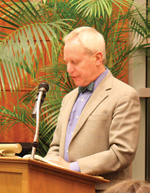The following is an excerpt from David Mikics’s interview with Willard Spiegelman, author of Seven Pleasures: Essays on Ordinary Happiness. The entire interview can be found online in our podcast series at The Open Academy: Honors Professors in Conversation.
DM: Willard, you begin the book by making a confession in response to a conversation you had on an airplane with a woman who mentions that she has endured some horrible traumatic events in her life and you say something along the lines of “nothing horrible has ever happened to me” and I just wanted to ask you how that realization shapes the book.
WS: The realization shapes the book because one of the things I realized as I was preparing a plan for the book is that the happiness industry in this country now seems to have two pillars. The twin pillars are religion on the one hand—and this is a much stronger pillar now than when I was a young person, religions of all stripes are more powerful in the way they draw people in—and on the other hand you have the psychopharmacological industry. We all know someone whose lives have been saved by pharmacology, but this is a recent phenomenon. I’m a person who has never chosen to hew either to religion or to psychopharmacology, and I realize in many ways this is a matter of bodily chemistry.
DM: You’re a weirdo. (laughs)
WS: (laughs) I suppose I’m the weird one, for my sanity. Part of it is chemistry, much psychological difficulty has a genetic base, but also I grew up in a situation where there was nothing much to complain about. Most memoirs nowadays are about abuse and tragedy, that’s what we really like; it’s a great schadenfreude. My life is much more tepid, which is why I hesitated to write about myself because I don’t think I’m very interesting.
WS: (later in interview) I take very seriously the truth of Thoreau’s observation that most men lead lives of quiet desperation. And it’s because most people seem either to have lost or never to have had a passion. I think it’s important for everyone, 18-year olds and 80-year-olds, both to do the things that give you pleasure (assuming these are legal things and are not self destructive), and at the same time, always be on the lookout for new things that will give you pleasure. Do not be unwilling to try something new. So, in my case it was doing things like becoming a dancer, which I had never thought I would do. And all of a sudden I was hooked on it. So there is always the chance to find new pleasures and to pursue them. The book is about the pursuit of pleasure in the pursuit of happiness, in order to maintain a sense of balance and (the word that I used in the beginning) sanguinity, or cheerfulness, which will help keep you afloat on the tide of life’s other kinds of turmoil.
To download the entire interview, visit





